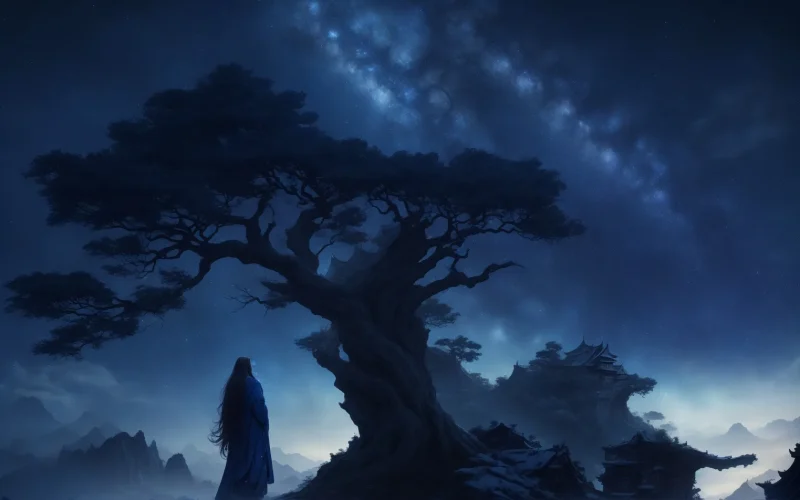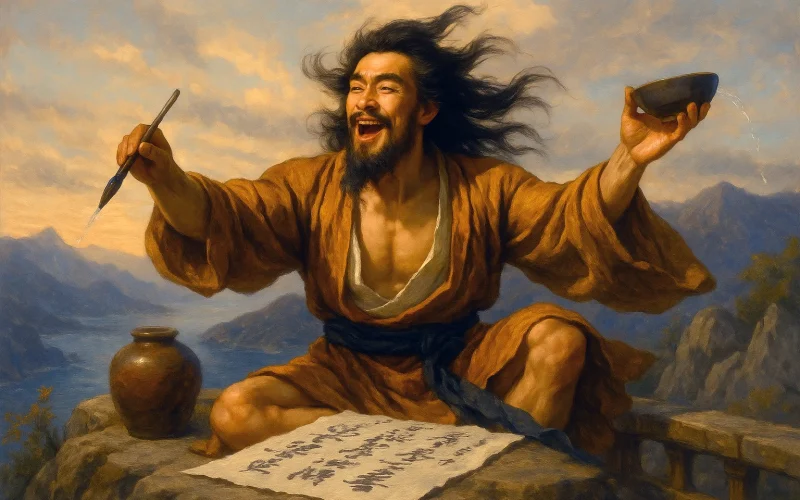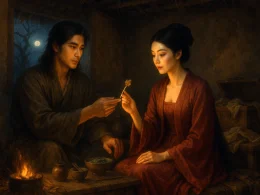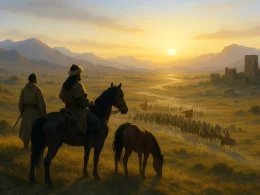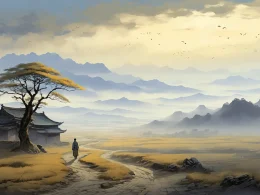Where are the great men of the past
And where are those of future years?
The sky and earth forever last;
Here and now I alone shed tears.
Original Poem:
《登幽州台歌》
前不见古人,后不见来者。
念天地之悠悠,独怆然而涕下!
Interpretation:
Chen Ziang was a Tang Dynasty scholar whose great ambitions were stifled by an unfulfilled career. Though he harbored aspirations to serve his country, he faced endless hardships in officialdom. While traveling north to Ji Gate, he climbed Youzhou Terrace (also known as Jibei Tower), gazing at the vast expanse of heaven and earth. Reflecting on both the past and present, he lamented his fate and composed "Song of Ascending Youzhou Terrace." Through mourning the wise sages of antiquity, the poet expresses his frustration at being unrecognized and conveys his sorrow over the brevity of life and the unpredictability of fate.
First Couple: "前不见古人,后不见来者。"
(Looking ahead, I see no sagacious rulers who valued and sought out the worthy; looking behind, I see no enlightened monarchs yearning for talent in the ages to come.)
These lines use time as a narrative thread, spanning both past and future, to express the poet’s deep dissatisfaction with reality and his profound sense of loss. He searches through history but finds neither wise rulers of the past nor enlightened sovereigns of the future. This loneliness and melancholy reflect the shared sentiment of many talented individuals who remained unrecognized under the feudal system.
Second Couple: "念天地之悠悠,独怆然而涕下!"
(Thinking of the vast and boundless universe, I find myself utterly alone, and sorrow overwhelms me as tears stream down my face.)
The poet places himself within the infinite cosmos, feeling small and helpless. The vastness of the universe contrasts with the brevity of human life, emphasizing his frustration at being unappreciated and unable to realize his ambitions. The intense sorrow transforms into tears that uncontrollably flow. Despite its brevity, this verse carries a powerful emotional weight, creating a strikingly desolate atmosphere.
Writing Features:
This poem is concise yet powerful, with deeply condensed emotions and profound meaning. Using minimal words, the poet conveys a vast conceptual space. The contrast between past and present, antiquity and the future, highlights the transient nature of human existence. The poem’s structure, with its varied rhythm, enhances the impact of its sorrowful tone, leaving a lasting impression on the reader.
Overall Appreciation:
"Song of Ascending Youzhou Terrace" is a poem rich in tragic grandeur. It is not only Chen Ziang’s personal lament over his unfulfilled aspirations but also an anthem for all ambitious individuals throughout history who failed to find recognition. Standing at the crossroads of history and reality, the poet expresses his overwhelming emotions about the boundlessness of the universe and the insignificance of human life. He mourns both his own unacknowledged talent and the many worthy individuals lost to history. The poem, though brief, carries a desolate and grand spirit, leaving readers deeply moved.
Insights:
This poem profoundly reveals the anguish of those whose talents remain unrecognized, reminding us that while history may be indifferent, true meaning lies in how we make use of our limited existence. It encourages perseverance despite adversity, urging individuals to leave their mark on the world. Even when faced with neglect and obscurity, one must remain steadfast, staying true to one's aspirations and making the most of life’s fleeting moments.
Poem translator:
Xu Yuan-chong (许渊冲)
In 659 A.D., Chen Zi'ang(陈子昂) was born in Shehong, Zizhou, a wealthy landowning family of a commoner clan. From childhood, he developed the character of a noble family's son who was chivalrous and made his temper. At the same time, he was concerned about national affairs and wanted to make political achievements.






